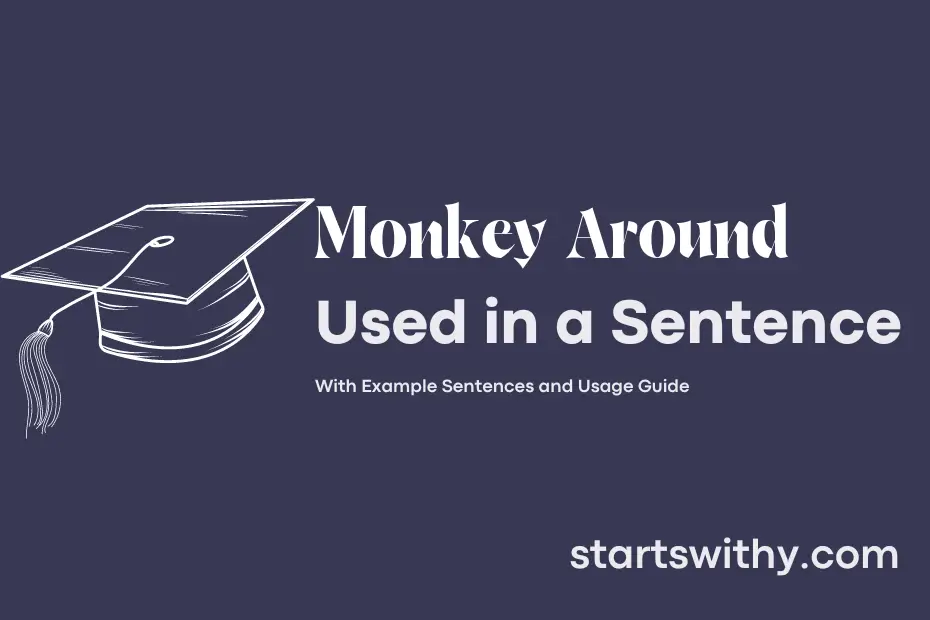Have you ever heard of the phrase “monkey around” and wondered what it means? In English, to “monkey around” is an informal expression that describes engaging in silly or playful behavior, often when someone should be focused on more important tasks.
This phrase is commonly used to remind someone not to waste time or act foolishly. So next time you catch yourself or someone else “monkeying around,” remember the importance of staying focused and serious when necessary.
7 Examples Of Monkey Around Used In a Sentence For Kids
- Monkey around during playtime.
- Let’s not monkey around in the classroom.
- It’s fun to monkey around at the park.
- We shouldn’t monkey around near the pond.
- Remember to not monkey around during storytime.
- It’s important to listen to the teacher and not monkey around.
- We can monkey around safely at the playground.
14 Sentences with Monkey Around Examples
- It’s hard to focus on studying when my roommates monkey around all the time.
- I sometimes like to monkey around during breaks to destress from college work.
- Our college canteen always has a group of friends who monkey around while waiting in line for food.
- The college cricket team likes to monkey around before matches to lighten the mood.
- Instead of studying, some students prefer to monkey around and play pranks on each other in the dorms.
- It’s fine to monkey around during free periods, but not when there’s an important deadline approaching.
- The seniors warned us not to monkey around during the college festival preparations.
- The professors don’t appreciate it when students monkey around during lectures.
- During college trips, the students would often monkey around in the bus to pass the time.
- It’s important to know when it’s appropriate to monkey around and when to be serious in college.
- Some students like to monkey around in the campus garden during their breaks.
- The college library is a quiet place to study, so it’s not the best idea to monkey around there.
- Many college clubs organize events where students can monkey around and have fun together.
- After a long day of classes, it’s nice to be able to monkey around with friends in the common room.
How To Use Monkey Around in Sentences?
To use “Monkey Around” in a sentence, simply follow these steps:
-
Understand the meaning of “Monkey Around”: This informal phrase means to fool around or waste time in a playful or silly manner.
-
Select an appropriate context: Think of a situation where someone is not taking something seriously and is just messing around.
-
Construct your sentence: For example, you could say, “Stop monkeying around and focus on your homework.”
-
Ensure clarity: Make sure the context of your sentence clearly conveys the idea of playful or frivolous behavior to avoid confusion.
-
Practice: Use the phrase in different sentences to become familiar with its usage and nuances.
-
Pay attention to tone: “Monkeying around” can have a lighthearted or slightly disapproving tone, so consider the tone you want to convey in your sentence.
-
Experiment: Feel free to experiment with different sentence structures and contexts to get a better grasp of how to effectively use “Monkey Around.”
Remember, practice is key to mastering the use of any phrase in English. So, keep practicing and soon you’ll be comfortable incorporating “Monkey Around” into your everyday conversations.
Conclusion
In conclusion, “monkey around” typically refers to engaging in playful or silly behavior instead of focusing on important tasks or responsibilities. This phrase is commonly used to remind someone to stop fooling around and start taking things seriously. For example, “We need to finish this project, so let’s stop monkeying around and get to work.”
Furthermore, when someone is told not to “monkey around,” it is a straightforward way of telling them to stop goofing off and to start behaving more responsibly or taking a situation more seriously. It is often used in informal contexts to express the idea of stopping playful or unproductive actions and focusing on what needs to be done.



